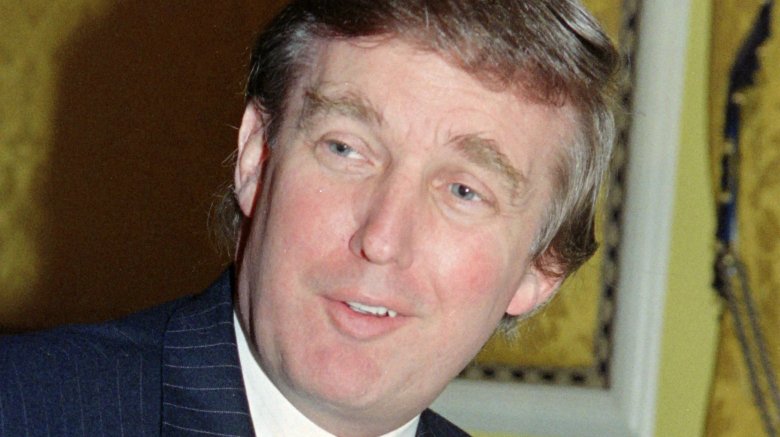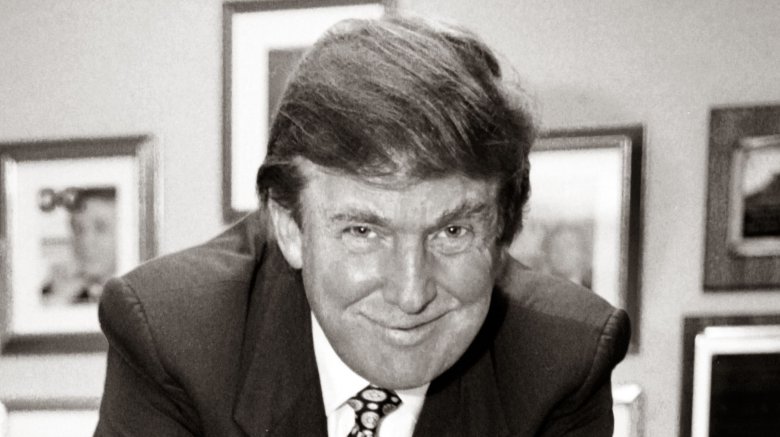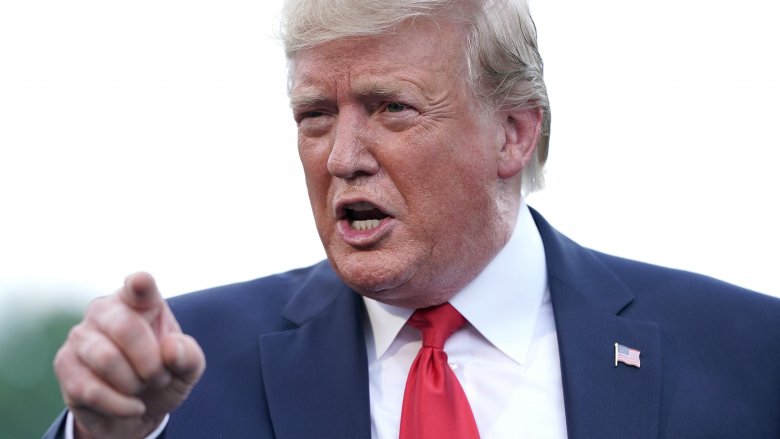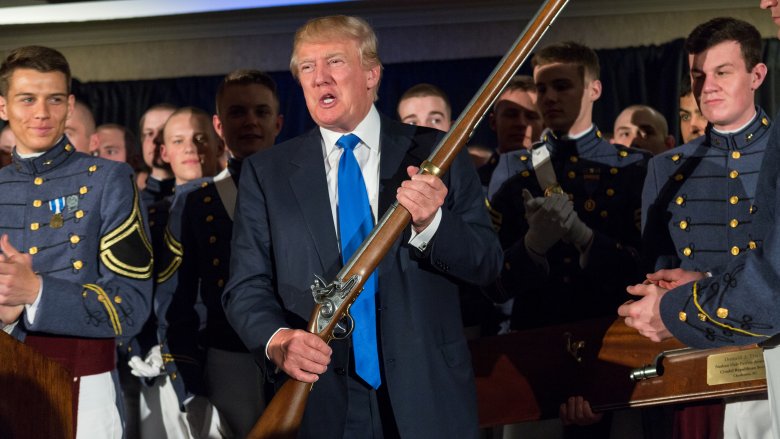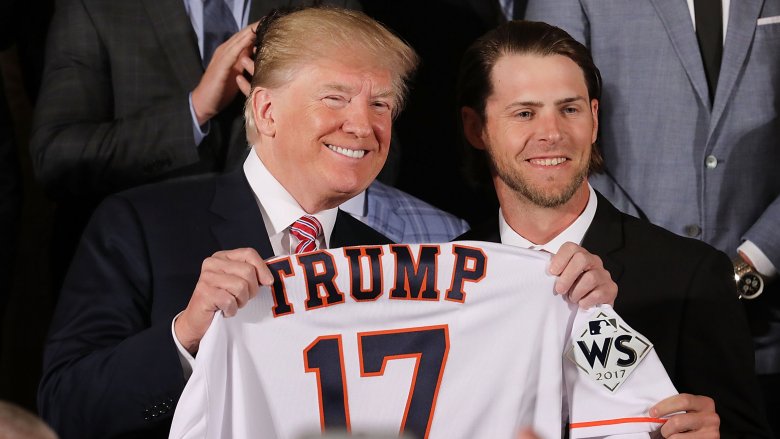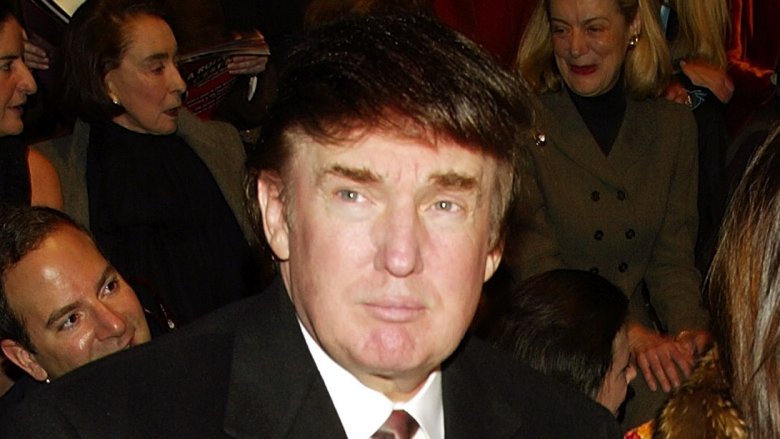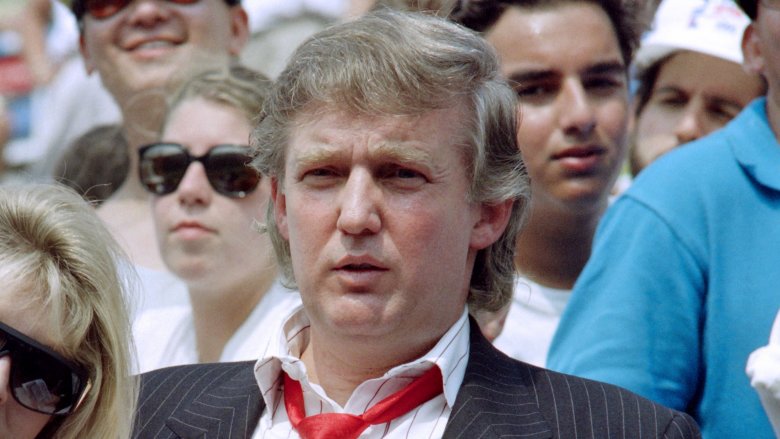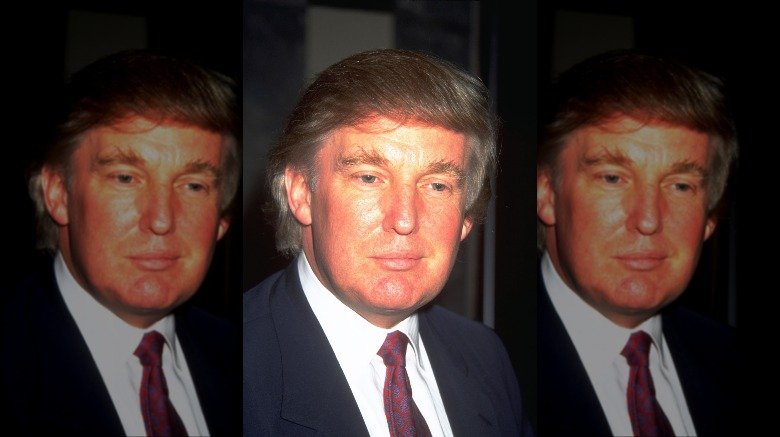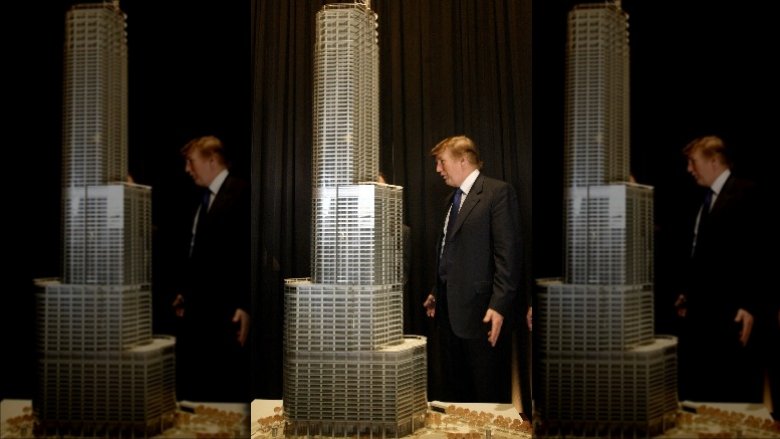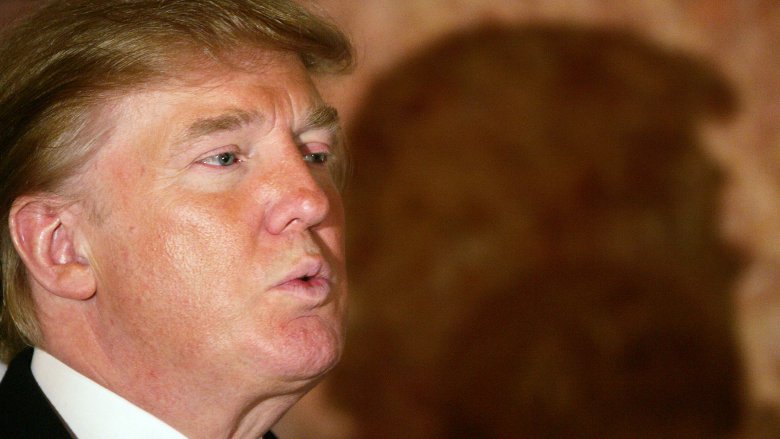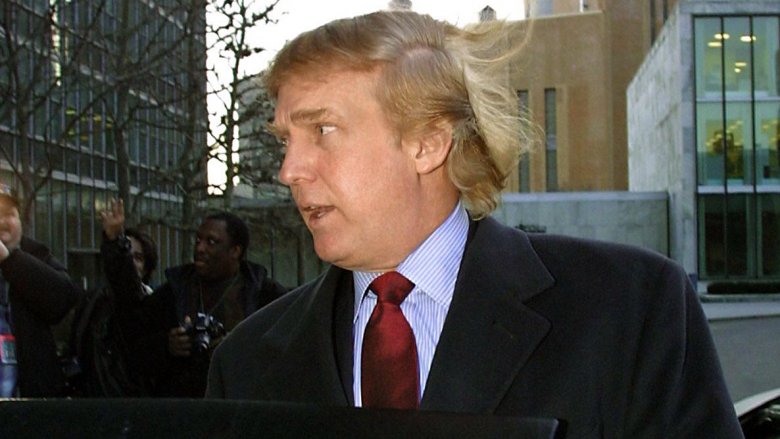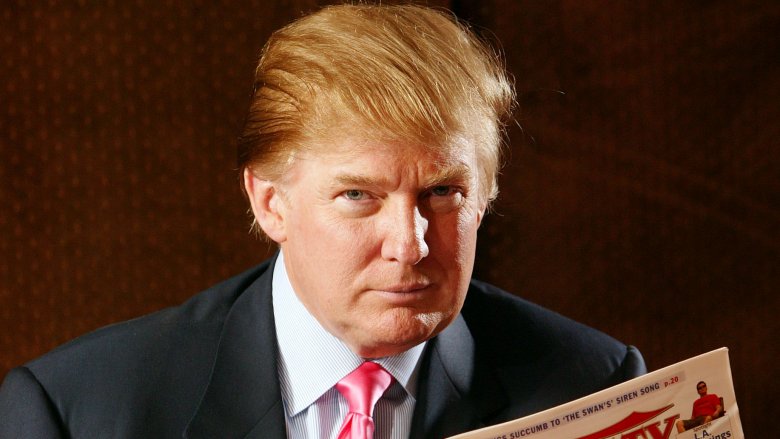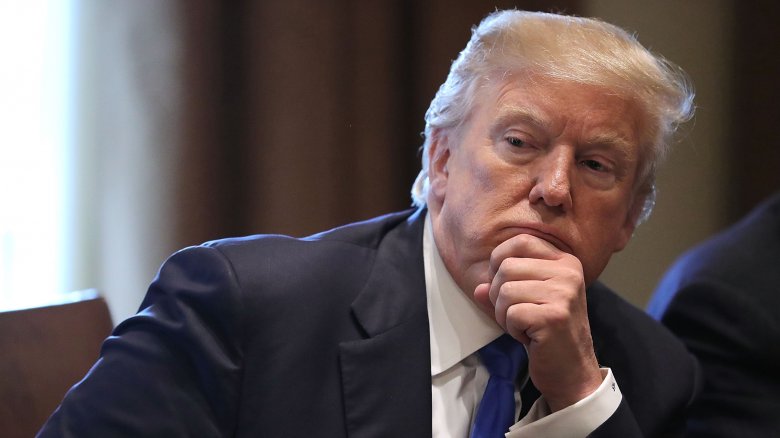Donald Trump Before The Fame
Long before his starring turn on The Apprentice, iconic hair style and orange skin, penchant for Twitter, and, of course, the presidency, Donald Trump was just a regular — and, uh, very wealthy — man. Having grown up as the favorite son of a well-known businessman, he seemed destined for incredible riches, fame, and controversy. Born to Mary Anne McLeod and real estate developer Fred Trump in 1946, this New York native pretty much made noise wherever he went.
But while Trump is one of the most recognizable names in the world these days, this wasn't always the case. Before he was famous, his feats were recognized on a much smaller scale. In the years since, however, the dirt on Trump's early exploits have come to light, some good and some bad. We've worked from first-hand information, public records, and hearsay to examine some of the biggest moments from his childhood, school days, and beginnings in real estate. No matter how you might feel about this TV star-turned-politician, it's possible that by digging into his past, we might come to better understand the person he is today. We bring you Donald Trump before the fame.
Donald Trump and his childhood 'oasis'
Donald Trump grew up in the Jamaica Estates of Queens, New York, a secluded and wealthy neighborhood of stately houses that his father helped build. While speaking with The New York Times in 2015, Trump described the area as "safe" — an "oasis" that differed from many of the borough's so-called "rough" areas.
While Trump stated his childhood experiences gave him a glimpse into what New York "was all about," others claimed that it painted a very exclusive picture of the city. The publication itself, for example, referred to it as a "nearly all-white place, resistant to outsiders and largely impenetrable to minorities." In fact, Queens' population was more than 96 percent white in the 1950s (via The New York Times). However, the city had become one of the most diverse in the nation by 2010. According to census reports, Jamaica Estates had changed, as well, with white people representing less than 15 percent of the population.
Harvard sociologist Robert Samson told the media outlet in 2018 that he believes Queens' "explosion of immigration" left an impression on Trump, and may have even led to his presidential campaign slogan: "His constant references to making America great again evoke an earlier time that was considerably less diverse."
Was Donald Trump the neighborhood bully?
They say you can learn a lot about a person by looking at them as a child. In Michael D'Antonio's 2015 book, Never Enough: Donald Trump and the Pursuit of Success, Donald Trump himself said, "When I look at myself in the first grade and I look at myself now, I'm basically the same" (via The New York Times).
The shoe might just fit. Many who knew Trump as a young boy described him as a bit of a troublesome, hypercompetitive, and powerful child, which rubbed people like childhood neighbor Heather Macintosh the wrong way. "She really didn't like him," her husband, Edmund Hayes, told the media outlet. Macintosh herself remembered little outward affection in the Trump home, claiming the kids "never got a hug or a kiss." However, Trump would still protect the house as best he could. As former neighbor Laura Manuelidis claimed, if a ball accidentally entered the property, Trump would take it and yell, "I'm going to tell my dad; I'm going to call the police."
Meanwhile, Trump's former classmates spoke of a more threatening child in 2016's Trump Revealed: An American Journey of Ambition, Ego, Money, and Power. According to The Washington Post, Dennis Burnham was warned to "stay away from the Trumps" after Trump allegedly threw rocks at him from behind his fence, while Steven Nachtigall noted the "unusual and terrifying" beating alleged "loudmouth bully" Trump reportedly gave another boy.
Donald Trump meets the Military Academy
During his teens, Donald Trump's parents sent him to the New York Military Academy. "I was a wise guy, and they wanted to get me in line," he told The Washington Post in 2016. "Thinking back, it was a very positive influence." In fact, he once claimed that he got "more training militarily than a lot of the guys that go into the military." Um, okay.
Still, Trump apparently rose through the academy ranks over the years. "I did very well under the military system," he later told the publication. "I became one of the top guys at the whole school." During his senior year, Trump was named captain of A Company, but was reassigned after a month. "I did a good job and that's why I got elevated," Trump explained. However, others have claimed it had more to do with his officers using controversial means to "keep younger cadets in line."
A former cadet named Lee Ains, who was allegedly hazed during this time, said, "[Trump] was a delegator. I think he knew a lot of things [going on in the barracks], but I don't know how far he dug into it." Another captain explained that Ains went to school administrators, and the change was made "to get [Trump] out of the barracks."
Donald Trump: the star athlete?
If Donald Trump hadn't set his sights on following in his father's footsteps, he might have become famous for a much different reason. "I was supposed to be a professional baseball player," he said on When I Was 17 in 2010 (via MTV News). "Fortunately, I decided to go into real estate instead." He later claimed to biographer Michael D'Antonio that he was "the best baseball player in New York" (via Esquire).
Others have even backed up his claims, but seem to disagree on some key points. "He did well enough that he was scouted by the Boston Red Sox, a coach at West Point, and the Philadelphia Phillies," Major Theodore Dobias, Trump's baseball coach at New York Military Academy, told the Daily Mail. While Dobias remembered Trump as the team's first baseman, former classmate Ted Levine told Business Insider, "He could have probably played pro ball as a pitcher."
Fellow former cadet Sandy McIntosh recalled one of Trump's greatest games — and hinted at a tendency to embellish — in the New York Daily News. "The bases were loaded," he wrote in 2017. "We were losing by three. [Trump] hit the ball ... All four of our runs came in; we won the game." While Trump claimed he "hit it out of the ballpark," McIntosh noted that the fielders had simply misplayed the ball in a game that took place in "a high school practice field."
Trump took on higher learning before the fame
When Donald Trump called actress Meryl Streep "over-rated," it may not have been just simple name calling. According to Newsweek, he originally wanted to be a movie producer, but altered those plans only after he was rejected by the University of Southern California. Trump instead attended Fordham College for two seemingly unremarkable years before transferring to the Wharton School of Business. It's the latter reputable institution that Trump has since celebrated as his school, calling his alma mater ”the hardest school to get into, the best school in the world,” and ”super genius stuff.”
Over the years, several reports have stated that Trump "graduated first in his class" in 1968. However, some have since questioned the man's academic proficiency. According to The Daily Pennsylvanian, he apparently didn't receive any honors upon graduating from Wharton. In fact, there have also been claims that his acceptance into the school itself was suspicious. The Washington Post reports that James Nolan, the admissions officer who met with Trump, was also one of older brother Fred Trump Jr.'s best friends. While Nolan claimed that getting into the school in 1966 ”was not very difficult,” he suspects the rating he gave Trump "must have been decent enough to support his candidacy." Hm.
Donald Trump and his failed attempt as producer
After graduating from college in the late '60s, future real estate investor Donald Trump still had his sights set on breaking into show business. According to The New York Times, a 23-year-old Trump took famous Broadway producer David Black out to lunch in 1970 to discuss a possible joint venture, and ultimately offered up $70,000 for a co-producer's credit on Black's next project.
Black accepted and got to work on the ill-fated Paris is Out! Trump got his credit, but, aside from asking why "the show's poster wasn't more prominently displayed," reportedly stayed relatively hands off. Unfortunately, the play flopped. After 112 performances, including previews, Black closed the curtains on both the show and his partnership with Trump.
Just like that, Trump's producing days were over. However, he would reportedly try to get involved in the theater again. Playbill reports that his first attempt was rumored to be a musical based on his life, aptly called Trump, which never came to be. Next came an idea for a musical based on The Apprentice. While this show got closer to opening in 2006, it too fell apart before it started.
Why Donald Trump never served in Vietnam
When it came time for the Vietnam War draft, Donald Trump recalled watching the draft numbers roll in while studying at Wharton. "I'll never forget; that was an amazing period of time in my life," he said in a Fox 5 New York interview (via The New York Times), adding, "And I got a very, very high number." This high number — and four deferments to complete his studies — would ultimately exclude Trump from the war. However, that doesn't seem to be the real reason why he never served. In fact, Trump's number was called in 1969, but by then, he had already graduated from college and acquired a "coveted 1-Y medical deferment" for bone spurs in his heels.
While Trump claimed to not remember much about who gave the diagnosis that ultimately led to his medical exemption, The New York Times put forward a possible answer in 2018. Dr. Larry Braunstein, a podiatrist out of Queens, was working out of an office owned by Trump's father, Fred, at the time, and allegedly wrote the diagnosis as a favor. "If there was anything wrong in the building, my dad would call and Trump would take care of it immediately," one of Braunstein's daughters claimed of the alleged return. "That was the small favor that he got."
How Donald Trump began dabbling in real estate
At the age of just 17, Donald Trump was technically already the owner of an apartment building that had been transferred to his name from his father's. However, he didn't really act independently as a businessman until he was at Wharton. Still, Trump saw his future in this business early on. "I'm going to be the king of New York real estate," he reportedly told his fellow classmates on day one (via The Boston Globe). This attitude — and "access to real money" — was apparently the main difference between Trump and his peers. "We were wondering what we wanted to do when we grow up," former classmate Ted Pollard recalled. "He was already there."
Indeed, the media outlet reports that before he even graduated, Trump was buying and selling properties with a $2 million loan from his father. "I didn't want people to know I was buying, because I started to develop a good reputation for being a good buyer," Trump told the publication. "Once they start knowing your name, the price goes up. So I would use corporate names or I would use different names. I developed a little reputation for making good deals and I didn't want them to charge me."
Trump's first stop? Swifton Village
Before Donald Trump took over New York City, he cut his teeth in Cincinnati. In his book, The Art of the Deal, the real estate mogul called Swifton Village, the building of which his father named him property manager, his "first big deal" (via the Los Angeles Times). While Trump remembers his work in Cincinnati fondly whenever he revisits the city, it wasn't always smooth sailing for the Trumps in The Queen City.
According to the Los Angeles Times, a 1969 racial discrimination lawsuit was filed against Fred Trump's company when Haywood and Rennell Cash, a black couple, were continually denied a rental property. After a white woman by the name of Margaret Faye Boyar feigned an interest in renting and was made an immediate offer, she quickly confronted the in-house property manager on the matter with the Cashes. In addition to reportedly being told they were committing fraud, Boyar alleged that the property manager used a racial slur and "began screaming at me ... that 'neither you nor Mr. Cash can have any d**n apartment.'"
Though Donald Trump himself was never named in the resulting lawsuit — and his father never admitted any guilt — the case was eventually settled after the organization offered to rent an apartment out to the Cashes.
Donald Trump faced more renting issues
Though the Trump name was already big and powerful in New York City during the 1970s, Donald Trump hadn't yet formed his own reputation there. Shortly after joining his father's organization, however, the company came under fire for racial discrimination in the Big Apple.
According to The Washington Post, two "testers" helped expose the alleged bias by attempting to rent an apartment from one of Trump's Brooklyn complexes. Not unlike the alleged circumstances surrounding the Cincinnati lawsuit, a white tester was given a choice of apartments after a black tester was denied on the so-called basis of no vacancies. More information gathered during government interviews revealed that some applications from black applicants were marked with coded language, such as "No. 9" and "C."
By 1973, a civil rights case had been filed against Trump Management Inc. for violating the Fair Housing Act of 1968. According to the Los Angeles Times, Donald Trump was president of the company at this point. Over the next 20 months, the case played out for the whole world to see, and resulted in a decree that the Trumps allow minorities into their buildings according to state laws. While Trump rejected the notion that the eventual settlement was an admission of guilt, the opposition celebrated the case as "an important, significant step for enforcement of the Fair Housing Act."
Even the Trump Tower was controversial
In 1980, Donald Trump set about his biggest undertaking by that point: the Trump Tower. While it would help make him into the celebrity he would become, it wasn't without controversy.
According to The New York Times, Trump "employed a crew of 200 undocumented Polish workers who worked in 12-hour shifts, without gloves, hard hats or masks, to demolish the Bonwit Teller building on Fifth Avenue." They allegedly worked in horrible conditions, were paid less than half of what union wages were at the time, and would ultimately file a lawsuit against Trump, which wouldn't be settled until 1998.
However, the project itself also created quite the stir. After Trump promised the historic limestone reliefs from the Bonwit Teller store to the Metropolitan Museum of Art, per The New York Times, they were destroyed by the workers. In addition to dismissing the reliefs as "without artistic merit," an account from a New York Magazine reporter claimed that Trump would later gloat about "the junk I destroyed at the Bonwit Teller."
The loss of Donald Trump's older brother
While Donald Trump has proudly boasted that his father taught him everything he knows, he also learned quite a bit from older brother Fred Trump Jr. Sadly, the lessons were more about what not to do, at least according to the future president.
Once a successful pilot, Fred Jr. unfortunately struggled with alcohol abuse, and eventually divorced, stopped flying, and moved back in with his parents by the late 1970s. Meanwhile, friends of Fred Jr. claimed that younger brother Donald was often unhappy with him and would berate him for wasting his potential. "Donald put Freddy down quite a bit," Annamaria Schifano, who was the then-girlfriend of Fred Jr.'s best friend, alleged. Citing Donald Trump's alleged tendency to pick fights with his brother before storming out, she added, "There was a lot of combustion."
In 1981, Fred Jr. passed away as a result of his alcoholism. According to The New York Times, Donald Trump revealed that "he had learned by watching his brother how bad choices could drag down even those who seemed destined to rise. Seeing his brother suffering led him to avoid ever trying alcohol or cigarettes."

